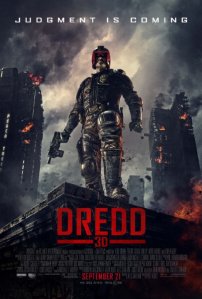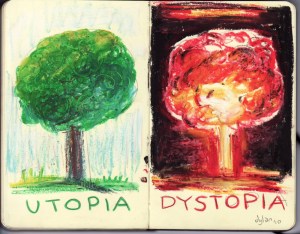Dystopian fiction has always been one of my favorite concepts in literature. Ever since reading Orwells’s 1984 in high school, followed by Aldous Huxley’s Brave New World, I developed a slight, SLIGHT, obsession. A dystopia, for those of you who don’t know, is basically the opposite of a utopia. It’s an idea proposed to challenge the concepts used to achieve a utopia. For instance, Judge Dredd (super-future-cold-hearted-etc cop) does a hell of a job enforcing the law and minimizing crime rates, but does so at the cost of impoverished citizenship with leaps and bounds of social prejudice. For the rich this might seem like a utopia, but even from that perspective, I doubt you could argue against the derelict living conditions of 90% of the population. Some other fun dystopian universes I enjoy (Yay!):
- The Matrix
- Equilibrium
- Clockwork Orange
- Lord of the Flies
- Blade Runner
- Animal Farm
- I, Robot
- Hunger Games (Not a favorite but there may be consequences if it goes unnoticed!)
Anyway, these fictional representations were created to convey the important alternative to over controlling attempts toward utopian conditions. The term was coined by John Stuart Mill in 1868, but took off in the fictional world in the 20th century, fortunately for us. The underlying theme is built upon current/future political and cultural concerns. George Orwell wrote 1984 shortly after World War II in response to the rise to totalitarian governments such as Nazi Germany and Stalin’s Soviet Union. They are usually directed at current social, political, and economical trends that are exaggerated to create satirical alternate universes.
Here’s an excellent slideshow explanation by Arik Durfee on Prezi
So why do we enjoy this genre?
Powerlessness. The world is constantly changing around us, environmentally, politically, socially, and we often have no control over these changes, leaving us feeling powerless. Much like the heroes and heroines in dytopian stories, we feel oppressed, monitored, and controlled. Dystopian stories offer a surreal escape from the numbing world we live in. So why don’t people look toward optimistic stories of love and happiness for their escape? An article by Lauren Sarner of the New York Daily News states it well:
Dystopian realities tend to come with incredibly high stakes. Government oppression and corruption is a common trope, as well as wars, forced conformity, religious fanaticism, and heroes facing odds that are incredible to the point of hopelessness. Most of all, they feature heroes fighting against those odds. Dystopian heroes typically suffer more than ordinary heroes, and not all of them make it out alive, but they all put up a fight.
Read more: Dystopian Fiction and its Appeal
I think people reflect themselves in the story. They want to be the character who has the courage to stand up against an overpowering force. Stand up for what’s right, and persevere against the immense hardships they endure. So, why do you think people, YA and adult, are so interested in dystopian settings?



April 12, 2014 at 12:50 pm
Mine would be: Atwood’s THE HANDMAID’S TALE and Ishiguro’s NEVER LET ME GO. The second one in particular I highly recommend. http://www.amazon.com/Never-Let-Me-Kazuo-Ishiguro/dp/1400078776. I also think that Julianna Baggott’s PURE is worth checking out: http://www.amazon.com/Pure-Julianna-Baggott-ebook/dp/B004RCNGSK/ref=sr_1_1?s=books&ie=UTF8&qid=1397306935&sr=1-1&keywords=pure+baggott.
My question to you is: Why are they so popular right now? What need inside us do these books fill?
April 15, 2014 at 1:33 pm
Reblogged this on Literary Citizenship and commented:
Another way to think about Literary Citizenship: do we have an obligation to raise and address social issues in what we write? Does what we read reveal our societal concerns? For example, one of my favorite dystopian novels is The Handmaid’s Tale by Margaret Atwood, which I realize speaks to my anxieties about women’s equality. Read this post by Eric Long and share with us your favorite dytopian novels and WHY you like them.
April 17, 2014 at 3:45 am
I know a lot of people really kind of like dystopian novels, games, etc. but I’ve never been one for them. I think I personally don’t like them because I already have like, a cynical enough perspective today that I don’t want to read or mentally participate in anything that is all about a really run down, broken society. It also has to do with the more fantastical aspect of it all, too. I tend to like reading things that are based more in realism, but some things can be inventive. So, I think that’s another reason why I prefer not to read dystopian stories. I have a hard time enjoying the new “universe” of the society that’s so drastically different from anything we could know today. It definitely is a good, analytical conversation to have as to why the dystopian society has appeared so much in our culture nowadays. I think this post does a good job of contributing to that larger discussion.
April 17, 2014 at 7:39 pm
https://www.goodreads.com/blog/show/351-the-dystopian-timeline-to-the-hunger-games-infographic
If you haven’t seen this eric you should take a look at it. It’s a infograph my GoodReads that charts the popularity of dystopian fiction and the themes within the genre (Fun fact, it was at an all time low after 9/11)
April 17, 2014 at 7:49 pm
I think you say it well when you say people want to ‘reflect themselves [into] the story’. I think that is why people read these types of stories and why the YA genre has capitalized on it. Teens want to feel powerful in some way. “And, if you’re wondering why dystopian novels line the Teen shelves in particular — well, your teenage years are when you automatically feel the most powerless.” I think Lauren is right, but I think it also extends further to reach out to adults as well; it’s just that we can use teen protagonists in these stories to show this power struggle because they don’t have as much experience as adults. I think there is innocence with a younger protagonist, not specifically a teen protagonist. I think there is the appeal, for the reader, of seeing a character acting the way they wish they would act if a situation were ever to get as bad as what they do in a dystopian. A few years ago I actually created a website on YA dystopias and talked about why I thought they were popular (http://yadystopianlit.weebly.com/the-popularity-contest.html).
April 22, 2014 at 2:23 am
I’m also been fascinated by this genre of late. I was never an obsessive fan but the idea of dystopia and the types of stories (at least currently) that come out of it tend to have a certain feeling. We don’t look for happy and perfect stories because they are boring. I feel that a lot of these stories are a product of the fact that we kind of know the future is bleak and we hope to find some good in even the worst future. We think, “Well this hero(ine) is able to fight the system so maybe there is hope even when things get bad.
April 30, 2014 at 7:05 pm
Eric, be sure to create categories so that as you continue your blog, readers can find different kinds of posts you write easily. Also: you still don’t have an About page. Sigh.